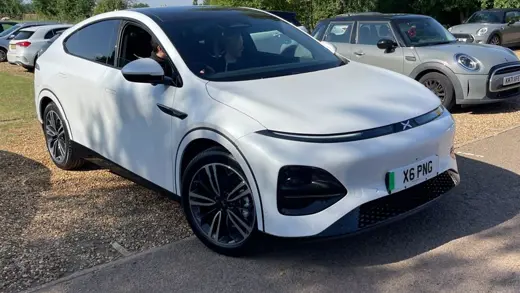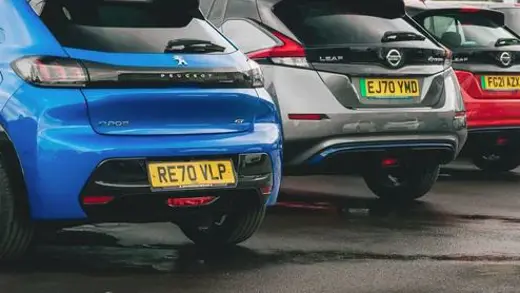
Electric Car Grant 2025
A New Push Towards Affordable EVs
The UK government has reintroduced a financial incentive for new electric vehicle buyers, known as the Electric Car Grant (ECG). With the aim of accelerating the transition to zero-emission vehicles, the new grant is set to make electric cars more affordable for thousands of private motorists and businesses.
What Is the Electric Car Grant?
The Electric Car Grant (ECG) is a government-backed discount offered to buyers of new, zero-emission electric vehicles. It replaces the former Plug-in Car Grant (PiCG), which ended in 2022, and forms part of a wider £650 million package aimed at boosting EV adoption and improving charging infrastructure.

How Much Is the ECG Worth?
The ECG offers two tiers of support, based on the environmental performance of the vehicle:
-
Up to £3,750 for vehicles in Band One (most sustainable manufacturing process)
-
£1,500 for vehicles in Band Two
The value of the grant is automatically deducted from the purchase or lease price by participating dealers and brokers, eliminating the need for a separate application from the buyer.
Who Qualifies for the ECG?
To be eligible for the Electric Car Grant, the vehicle must:
-
Be fully electric (battery electric, not plug-in hybrid)
-
Have a retail price of £37,000 or less
-
Be approved by the Office for Zero Emission Vehicles (OZEV)
-
Be manufactured by a company that has a Science-Based Target (SBT) for carbon reduction
The grant is available to both private individuals and businesses, although only brand-new vehicles qualify.
Need some advice on this grant? We’re here to make your leasing journey simple, clear, and stress-free.
What Are the Band One and Band Two Categories?
The government has introduced an eco-banding system to prioritise vehicles with the lowest overall environmental impact. The banding takes into account:
-
CO₂ emissions during battery production (weighted at 70%)
-
CO₂ emissions during final vehicle assembly (weighted at 30%)
-
The carbon intensity of the energy grid in the country of manufacture
Vehicles manufactured with cleaner processes and greener energy sources will be placed in Band One and will receive the maximum grant of £3,750.
When Does the ECG Start?
The Electric Car Grant officially launches on 16 July 2025 and will run until at least the 2028–29 financial year. Manufacturers must apply for each vehicle model to be considered for the scheme, and a full list of eligible models and their banding will be published by OZEV.
What Vehicles Will Likely Qualify?
While the full list is still pending, it is expected that vehicles like the Vauxhall Corsa Electric, MG4, Renault Zoe, and Fiat 500e may fall within the eligibility criteria based on price and production processes.
Popular electric vehicles, such as the Tesla Model Y, are expected to be excluded due to their higher retail prices, which exceed the £37,000 threshold.
What About Business Buyers?
Businesses can also benefit from the ECG when leasing or purchasing new EVs for their fleets. When combined with additional tax incentives — such as low Benefit-in-Kind (BiK) rates, salary sacrifice schemes, and reduced running costs — the ECG offers a significant financial advantage for companies looking to transition to electric vehicles.
Additional Support for Charging Infrastructure
The ECG is part of a wider government strategy to improve EV accessibility. The funding package includes:
-
£25 million to support home charging for drivers without off-street parking (including gully systems in pavements)
-
£30 million for workplace and depot charging, including NHS fleet support
The reintroduction of the Electric Car Grant is a major win for consumers and businesses looking to transition to electric vehicles. With a potential saving of up to £3,750, the ECG helps bridge the gap between electric and petrol cars, making it easier for more people to make the switch.
At Silverstone Leasing, we’re here to guide you through the process, from choosing an eligible EV to securing the best leasing deal with the ECG applied.
FAQs - Electric Car Grant 2025
From 1 April 2025, electric vehicles (EVs) will no longer be exempt from Vehicle Excise Duty (VED), marking a significant change in how zero-emission vehicles are taxed. For EVs registered on or after this date, a first-year VED rate of £10 will apply, which is significantly lower than for most petrol and diesel vehicles. From the second year onwards, these vehicles will move to the standard annual rate, currently set at £195. In addition, if your electric vehicle has a list price over £40,000, it will be subject to the ‘expensive car supplement’ of £425 per year for five years (from year two to six). This aligns EVs with other vehicle types in terms of tax treatment and reflects the government’s shift towards normalising taxation as EV adoption grows.
The Benefit-in-Kind (BiK) rate for electric company cars is increasing slightly in 2025. For the 2025/26 tax year, fully electric vehicles will be taxed at a BiK rate of 3%, up from 2% in the previous tax year. This still represents a very favourable tax position compared to petrol or diesel vehicles, which typically attract much higher BiK rates. The government has also confirmed that the BiK rate for EVs will rise gradually in the coming years — to 4% in 2026/27 and 5% in 2027/28 — offering long-term visibility for drivers and businesses planning fleet decisions. The BiK rate is applied to the vehicle’s list price and multiplied by the employee’s income tax rate to determine the annual tax payable. For example, on a £35,000 EV at 3% BiK, a 20% taxpayer would pay just £210 per year in company car tax.
The standard 45p per mile reimbursement rate, set by HMRC for the first 10,000 business miles, applies to petrol, diesel, and hybrid vehicles, not electric vehicles. For fully electric cars, HMRC publishes a separate rate called the Advisory Electric Rate (AER), which reflects the cost of charging rather than fuelling. As of June 2025, the AER stands at 7p per mile. This means that if you use a personal electric vehicle for business purposes, your employer can reimburse you up to 7p per mile without incurring tax. Reimbursing above this rate may lead to additional tax or national insurance implications unless you can provide evidence of higher actual electricity costs. While this rate is lower than the traditional 45p, it reflects the significantly lower cost per mile of running an EV.
Yes, electric vehicles can be 100% tax-deductible for businesses in the UK through a mechanism known as the First Year Allowance (FYA). This allows companies to deduct the full cost of purchasing a brand-new electric car from their taxable profits in the year of purchase. To qualify, the vehicle must be fully electric with zero emissions and must be purchased outright or via a hire purchase agreement. This scheme has been extended to remain available until at least 31 March 2026. Additionally, if a business chooses to lease an electric vehicle rather than purchase it, the lease payments are still fully deductible as a business expense against corporation tax. For sole traders and partnerships, tax relief depends on business usage and how the vehicle is funded. These incentives make EVs a beautiful option for businesses seeking to reduce their environmental impact while reaping substantial tax savings.
Hear from Our Happy Customers
At Silverstone Leasing, we believe the best way to understand the quality of our service is to hear directly from the people who matter most – our customers. In these short video testimonials, you’ll see real experiences from individuals and businesses who’ve leased with us. From first-time drivers to fleet managers, their stories highlight the care, transparency, and expertise that set us apart.


